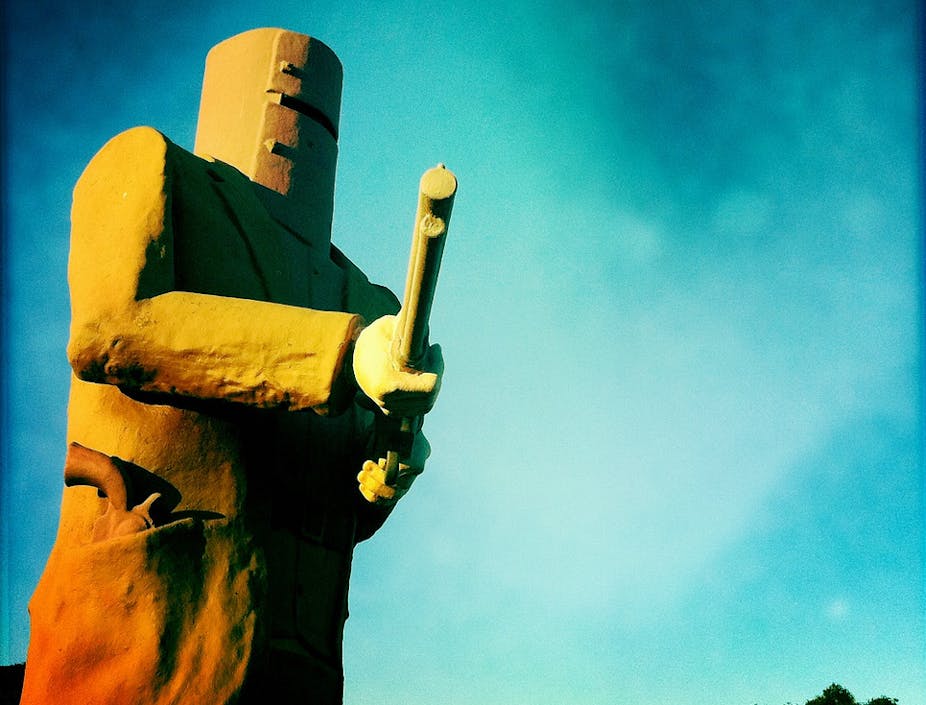Buried away in the correspondence columns of last week’s Sunday Age, a former history teacher’s letter “Where’s our history?” started an intense and confused debate about a “threat” by the national curriculum to Australian history in schools.
This controversy built when Tuesday’s Age reported, in a page one splash, that the “National curriculum declares history un-Australian.” The allegation in that headline was supported by a story which explained that Australian history would not be taught as a subject to year 11 and 12 history students under the proposed national curriculum.
The clear implication was that somehow the new national curriculum for Years 11 and 12 would kill off Australian history and the story of our nation’s past would be lost to generations of students.
This argument was then illogically and incorrectly rolled into a proposition that all students will somehow be obliged to forfeit the study of Australian history. Thanks to the national curriculum, our schools are heading for a cultural abyss, so the argument went.
Let’s clear up some misunderstandings that have featured in this, the most recent of many controversies about the teaching of Australian history.
Students will not “lose” their Australian history under the national curriculum. By the time they get to the beginning of Year 11, all Australian school students will, within the national curriculum, have had at least nine years of classes about their own nation’s past. More importantly, Years 9 and 10 feature a strong Australian narrative.
Further, if the relevant states and territories want to keep standalone Australian history or its nearest equivalent, it can stay on the books. If, on the other hand, the Victorian Curriculum Assessment Authority alone takes a decision to drop its Year 12 Australian history because of declining numbers and the fact that there will be a large Australian element in the national senior modern course, that will be a Victorian decision.
And that’s what Victorian history teachers should really be worried about. If there is a Victorian push for more sequenced Australian content in senior modern history, the writing could well be on the wall for standalone VCE Australian history.
Why, then, is Australian history in such sharp decline? It is the research, not individual letters of the “When I was at school…” variety, that gives us the answer.
First, the research reported in the 1999-2000 national history inquiry and further outlined in Anna Clark’s 2008 book History’s Children tells us that senior students and their teachers accept the importance of Australian history but see the subject as bland and dull when they compare Australian history with those of other nations and other societies. The French Revolution trumps Federation every time.
Moreover, the research shows that topic repetition during primary and middle secondary school years induces profound student boredom. Ned Kelly has only got so much mileage in him when taught in primary school and in Year 9. By Year 12, the yawns have set in. This over-familiarity breeds contempt, leading to adverse decisions about subject choice in senior school.
The figures are these: in 1998, 2308 students took the Australian Year 12 course but by 2011 the numbers had dropped to 1071. If this slide continues, by 2020 we shall probably see Year 12 Australian history figures in the low 500s.
Not that teaching Australian history within a more global senior modern history course will help much. New South Wales runs a popular High School Certificate (HSC) modern history course, with over 10,000 Year 12 students enrolled. Of that number, a mere 61 took the Australian history option within the 2011 course.
In all states and territories, the damage caused by cumulative boredom is real and it is lasting. Australian history’s reputation precedes it by Year 12.
What needs to happen is this. First, we must stop talking about Australian history as if we are parents encouraging our children to eat their greens. In my view, and I am not alone here, Australian history, especially its social history, is fascinating in its own right and needs to be sold as a complex, discursive engaging area of study, not offered as an unappetising dietary supplement.
Given a change of attitude, a fair timetabling allocation and the new and non-repetitive primary and mid-secondary national curriculum, Australian history may well thrive.
Second, we need more emphasis on getting qualified, capable and inspirational teachers into all high school history classrooms. We really don’t need history of any kind taught by a PE teacher armed with a textbook and wearing a puzzled frown. It is the strategic placement of engaging, confident specialist history teachers who will encourage interest in Australian history in Years 9 and 10 in a way that will keep the subject alive in Year 12.
Third, we need more emphasis in education faculties on the latest research into how history education is taught in the 21st century and less emphasis on the outmoded 1980s idea that discipline-based subjects are bad and good teachers can teach anything.
Fourth, devotees of Australian history should consider asking for a senior course that examines Australian social history in depth, rather than a general course that deals with mainly political and military themes, as is currently the case in Victoria.
Finally, we need informed public debate about this important topic. When it comes to the cyclical arguments about Australian history, everyone’s an expert – and everyone’s a critic. Not that I expect informed debate to happen any time soon, but it is not helped by a half-baked beat-up in the press.

